Machine learning is the study of computer algorithms that can automatically improve their capabilities through experience. The study is part of artificial intelligence (AI).
These algorithms can find hidden patterns in data, predict outcomes, and make decisions on with full autonomy and speedup.
During the second decade of the 21st century, machine learning (ML) is apparently the future of technology. Companies in every industry are utilizing it to optimize their operations.
Thus, although the technology is still under development, it’s not too early to start learning it. There are already thousands of use cases for machine learning, and even more are being released, including self-driving cars, chatbots, and facial recognition software.

If you are interested in a lucrative tech career, your path is in machine learning. According to Indeed, machine learning engineers in the United States earn $151,223 on average, probably becoming one of the highest-earning jobs.
Furthermore, the career prospects are excellent. The more companies transform and use machine learning and artificial intelligence, the more they need machine learning specialists.
You can get started with machine learning by taking online courses. There are many resources online to learn machine learning. Unfortunately, only some are of high quality.
I decided to do the heavy lifting for you. This article will only feature the best ones that I find beneficial for building your skills. You can then handily select the one that suits your learning style and start learning right away.
Affiliate Disclosure: This post from Victory Tale contains affiliate links. If you purchase any machine learning courses through these links, we will get a small commission from these platforms.
Nevertheless, we always value integrity and prioritize our audience’s interests. Therefore, you can rest assured that we will present all courses truthfully.
Things You Should Know
Prerequisites
You need to understand programming languages. Python is an optimal choice. Though you don’t need to be an expert programmer, you should have the ability to code in Python and some of its libraries: NumPy and Pandas. You will need both for data preprocessing.
A good understanding of basic data science concepts, statistics for data science, linear algebra, and college-level calculus would be beneficial, especially if you want to drill deep into the theoretical part.
Some courses may not have these requirements. However, I still insist you have all the prerequisites because it will help you learn faster and smoother.
Update (Dec 2021): Introduction to introductory courses, this post now features advanced machine learning engineering (starting at #10).
These programs aim towards learners who want to become machine learning engineers. Hence, before enrolling, you should have a solid background in machine learning algorithms (such as supervised and unsupervised learning).
Some courses may even require deep learning and frameworks (Tensorflow, PyTorch, or Keras). It is thus highly crucial to review all the prerequisites of a particular course beforehand.
Criteria
The following are the criteria for the best machine learning courses.
- Accessible on credible learning platforms
- Trustworthy instructors with more than years of experience in the ML field
- Offer good value for money
- Offer significantly better experience than studying from books and documentations
- Flexibility (Able to learn on my devices, don’t have rigid pricing plans, etc.)
- Mostly positive reviews from genuine learners
- My personal experience with the course, instructor, and learning platform (if any) must be positive.
Best Machine Learning Courses
1. Data Science: Machine Learning and Predictions
This excellent course from UC Berkeley will drill deep into machine learning concepts, particularly regression and classification. Upon course completion, you will handily identify patterns in your data and make precise predictions.

Course Content
This course will focus primarily on regression and classification, which will help you create a model that offers the best predictions.
Below is what you will learn from the course:
- Deep dive on regression, including correlation and bootstrap methods to quantify uncertainty
- K-nearest neighbor algorithm for classification
- How to test and optimize the efficiency of your models
- Applications to real-world scenarios, including medical diagnosis
This course is self-paced. Thus, you can create a personalized study schedule to complete the course. However, UC Berkeley suggests spending 4-6 hours per week for six weeks.
Auditing the entire course is free. However, if you want a complete experience, you need to pay a one-time $199 for the verified track.
Pros and Cons
Pros
- Excellent machine learning course that focuses on predictions
- Learn from faculty members of a top-ranked university
- Build machine learning models without requiring complex mathematical knowledge
- Self-paced learning
- Manageable workload
Cons
- Lack the comprehensiveness of other training courses. You need to purchase other courses if you want to drill deeper into advanced techniques.
2. Machine Learning with Python: from Linear Models to Deep Learning
If you want a course that includes all of our current knowledge of machine learning, you might want to enroll in this in-depth tutorial from MIT.
You need knowledge in linear algebra, calculus, and statistics to take this course.
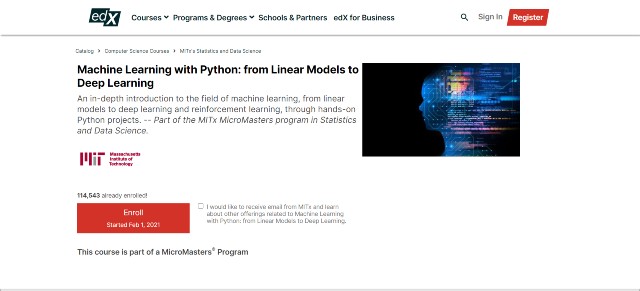
Course Content
- Introduction to Machine Learning
- General machine learning concepts (Linear classifiers, regularization, gradient descent, over-fitting)
- Linear regression
- Recommender problems
- Non-linear classification and kernels
- Clustering
- Deep learning and neural networks
- Reinforcement learning and natural language processing
- and many more
In essence, you will learn how to turn datasets into automated predictions of future data by utilizing machine learning.
In addition to the above content, you will complete as many as three machine learning projects, including creating an automatic review analyzer and digit recognition.
Once you finish all of the course videos, readings, and assignments, you will have a strong foundation in the subject and be ready to develop sophisticated models of your own.
Since this course is instructor-led, your schedule will be tighter than a self-paced one. MIT expects students to spend up to 10-14 hours per week.
You can audit this course for free, while the verified track, which includes graded assignments and a certificate, will cost you $300.
As this course is a part of the micromaster program, you will get an extra discount if you enroll in the entire program.
Pros and Cons
Pros
- Comprehensive curriculum: It covers all major machine learning concepts within a single course
- Provide three real-world projects to work on
- Informative and in-depth
- Math-heavy. If you want to understand these concepts clearly, this course is probably the best option.
Cons
- This course is instructor-led and demands an extremely high weekly commitment of 10-14 hours. Hence, it may not be suitable for those with busy schedules.
3. Machine Learning A-Z™: Hands-On Python & R In Data Science
This Udemy course by Kirill Eremenko, Hadelin de Ponteves, and the SuperDataScience team is a few courses that offer machine learning training for both Python and R.
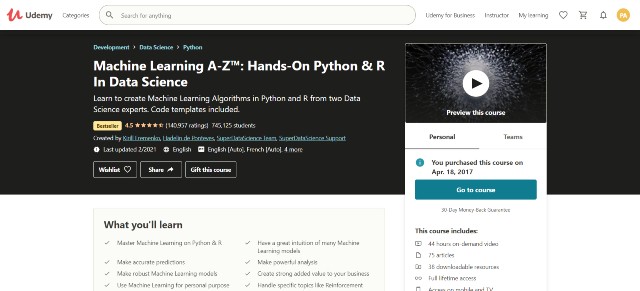
Course Content
The entire curriculum consists of 2 parts, a Python part and an R part. Course content for both is similar. The only difference is the programming language used. If you want to learn machine learning using Python, you can skip all R’s parts with no issues.
Below is what you will learn
- Introduction to machine learning (A brief introduction to clarify basic concepts such as the difference among machine learning, deep learning and artificial intelligence)
- Data Preprocessing (Cleaning and dealing with missing data, encoding categorical data and feature scaling)
- Deep dive on regression (Linear, Polynomial, Support Vector, Decision Tree and Random Forest)
- Logistic Regression and K-nearest neighbors
- Support Vector Machines (SVM), Decision Trees and Random Forest Classification
- Clustering
- Apriori (Association Rule Learning)
- Reinforcement Learning and Natural Language Processing (NLP)
- Deep Learning (Artificial/Convolutional Neural Networks)
- Dimensionality reduction
- How to choose suitable models and optimize for optimal performance
The video length of the course (including Python and R) is 44 hours. Thus, each part will be 22 hours long. After purchasing, you will have lifetime access to the content.
As one of the most popular machine learning courses on Udemy, Machine Learning A-Z™ receives 4.5/5.0 stars from more than 744,000 students.
Pros and Cons
Pros
- One of the best online courses on machine learning for beginners
- Well-structured and concise
- Includes all areas of machine learning from basic regressions to deep learning
- Good supplementary resources
- Python and R options to choose from: You can choose to complete either of them or finish both if you are interested.
- Always up-to-date (The instructors provide an update every 2-3 months.)
- Self-paced hence fits those with busy schedules.
Cons
- The instructor notes that you need only high-school mathematics for this course. I have to disagree strongly. The content is too sophisticated for most students to understand without computer science knowledge (able to code in Python or R) and basic data science. I survived because I took Python courses before.
- Sometimes, the instructor’s voice is slightly mumbled, so it isn’t always easy to understand.
4. Datacamp
Datacamp is an online platform that teaches data science and related applications, including machine learning. If you want to learn data science innovatively anytime, anywhere, I think you should consider Datacamp.
The best thing about Datacamp is its interactive learning. You won’t learn from boring videos. Instead, you can follow the text instructions and complete many exercises online as below.
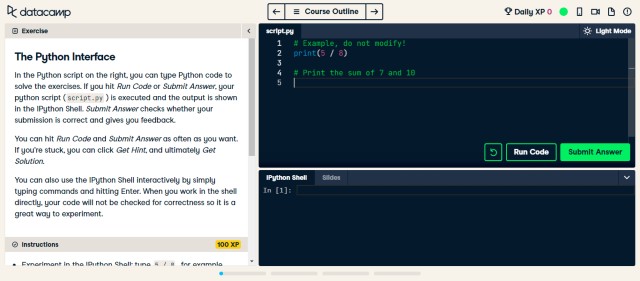
Course Content
You can choose any learning path, including
- Machine Learning Fundamentals with Python
- Machine Learning Fundamentals with R
Each track comprises several courses. For example, the Python option will have five classes, which will take approximately 20 hours to complete.
In total, Datacamp has as many as 92 online courses for machine learning, along with an extra 21 projects and hundreds of data-science-related courses.
Pricing
Below are Datacamp’s subscription plans: The pricing is for annual plans.
- Premium – $12.42 per month billed annually
- Teams – $25 per month
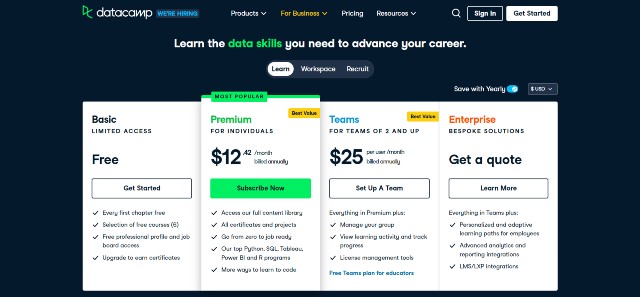
The Premium plan provides access to all content on the platform. Therefore, this plan is adequate for most learners. The Teams plan adds features for team management, which is beneficial only for enterprises.
I suggest trying the courses before making decisions. After creating an account, you can access the first chapter of every machine learning course for free.
Pros and Cons
Pros
- Beginner-friendly
- User-friendly web and mobile platforms, allowing students to learn anywhere, any time.
- Gamified learning system is addictive. Based on my experience, you will get bored much slower.
- All-inclusive pricing. In addition to machine learning, you can take other data science courses, including data analytics, data visualization with Tableau, and many more.
Cons
- The courses are not in-depth. Students who want to drill deeper into advanced concepts and applications have to find online courses elsewhere.
5. Become a Machine Learning Engineer
This Udacity Nanodegree program is excellent for students who want to enhance their machine learning knowledge and skills beyond basic techniques.
You will learn from leading experts who have years of experience building and deploying machine learning models at tech giants like Amazon.
Unlike the above courses, this program will feature advanced algorithms and relevant techniques. Thus, you will need background knowledge in machine learning models, including supervised, unsupervised, and deep learning models (neural networks.)
If you have not taken deep learning courses, I recommend visiting my other post on deep learning courses to select the best ones.
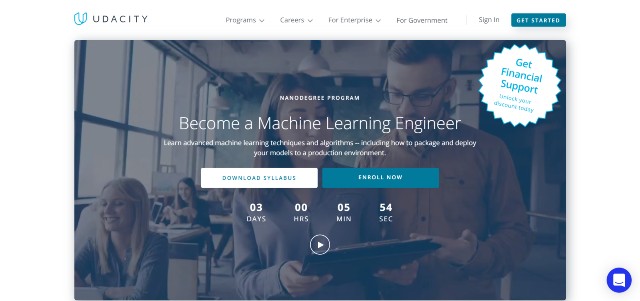
Course Content
This program comprises four sections as follows:
1. Software Engineering Fundamentals – The first section will provide training on writing optimized and production-level code. Instructors will also drill deep into object-oriented programming and how to integrate it into machine learning models.
2. Machine Learning in Production – The second section will explain how to deploy machine learning models using Amazon SageMaker, one of the most popular enterprise-level machine learning platforms.
3. Machine Learning Case Studies – The third section will focus on case studies. You will apply machine learning techniques to provide solutions for real-world tasks.
4. Capstone – This final section is essentially the project. You will provide a comprehensive solution for real-world tasks from scratch. You will perform data exploration, feature extraction, model building, and finally generate actionable insights.
All sections (except the last one, which is a project in itself) will be equipped with learning resources, such as quizzes, assignments, and projects that you can practice to improve your skills.
Regarding projects, you will perform real-world tasks that you can develop further upon, such as building a plagiarism detector or deploying a sentiment analysis model.
Compared to other machine learning courses, Udacity offers much better student support, which includes the following:
Mentor Support – You can use the chat interface on Student Hub to ask your mentor any questions related to the program. This support would be highly beneficial if you don’t understand some concepts or get stuck in coding challenges.
According to Udacity, most students receive a reply within an hour, which is very fast. Hence, you can rest assured that experts are always accessible. You don’t need to be frustrated waiting endlessly for someone to reply like typical online courses again.
Project Reviews – You can submit your projects for experts to review. After reviewing your project, they will provide personalized feedback, tips & tricks, and best practices that you can implement to improve it.
The best thing is that Udacity does not limit the number of submissions. Thus, you can submit your project anytime you change your model.
Most students receive a response in slightly more than an hour, creating a speedy feedback loop from which you can benefit significantly.
Career Services – Upon program completion, Udacity’s team will review your resume, cover letter, LinkedIn Profile, and Github portfolio to ensure that you are ready for job applications.
Udacity suggests spending 10 hours per week on the program, and you will complete it in 3 months. However, as the program is self-paced, you can freely adjust your learning according to your changing schedule.
This means you can take more time than the suggested three months. However, the drawback is that you will need to pay more tuition, as Udacity uses the subscription model (see below.)
Pricing
The tuition for this program is $399 per month. Alternatively, you can pay for three months at once and receive a 15% discount so that you will pay only $339 per month.
Nevertheless, Udacity frequently offers discounts and financial support (the latter is accessible after creating a free account.) These excellent offers will reduce the tuition by up to 75%. Thus, you might pay only $100 for the program or even lower.
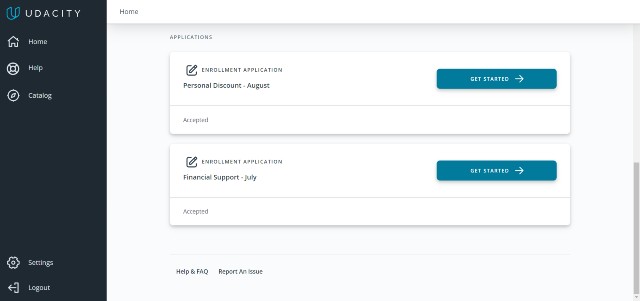
Some prospective students wonder whether Udacity’s Nanodegree program is worth the price. I am confident it is.
The support you will receive alone justifies the price. Unlimited expert access saves your valuable time and eliminates any frustration from your learning, not to mention its well-structured curriculum that will help you gain in-depth knowledge.
[sc name=”udacity” ][/sc]Pros and Cons
Pros
- Best machine learning course for experienced students who want to master machine learning
- Learn from leading industry experts
- Cover practical machine learning skills, including Amazon SageMaker and model testing
- In-depth and innovative lessons
- Practical exercises and projects
- Learn at your own pace
- Excellent support from experts who are accessible at any time.
- All Udacity programs are well-maintained. Thus, outdated content is rare.
Cons
- Costlier than most other alternatives
6. Machine Learning by Andrew Ng
This Coursera course from Stanford University is unarguably one of the best machine learning courses available online.
You will learn from Andrew Ng, a Stanford professor who is a leading researcher in machine learning and artificial intelligence and a co-founder of Coursera.
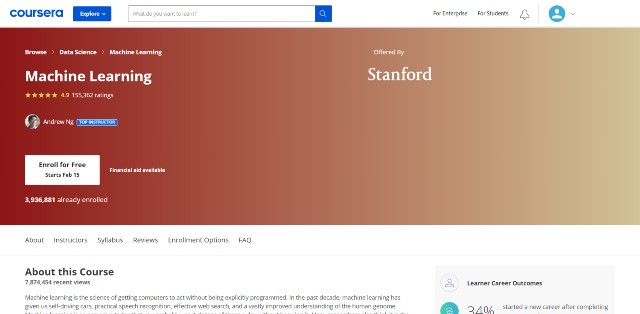
Course Content
Below is what you will learn from this course.
- Review of linear algebra concepts
- Linear regression with single and multiple variables (Short tutorial to Octave and MATLAB included)
- Logistic regression and regularization
- Neural networks (Representation and Learning)
- Best practices for machine learning applications
- Support Vector Machines (SVMs), a machine learning algorithm for classification
- Unsupervised learning (K-means clustering and principal component analysis)
- Anomaly detection and building recommender systems
- Machine learning for large data sets
At the end of the course, you will apply the machine learning concepts you have learned throughout the curriculum to build a photo OCR that can recognize elements such as numbers and words in images.
You should spend approximately 60 hours on the course. Auditing the entire course is free. However, you might want to pay $79 for complete access, so the instructor will grade your assignments and send you a certificate upon course completion.
Pros and Cons
Pros
- Learn from a leading researcher in machine learning
- Cover all major concepts, which are a solid foundation for those who want to progress to deeper topics such as deep learning or reinforcement learning.
- Well-structured Curriculum
- Clear explanations
- Free auditing
- Overall, an excellent course for every beginner to test the waters.
Cons
- The course content is broad and not in-depth. All the courses are designed for beginners. Still, some reviewers pointed out that it is oversimplified. If you already understand some of the basics, it may be better to consider other machine learning courses elsewhere.
7. Machine Learning Specialization
For those who completed Andrew Ng’s course and would like to gain more hands-on experience in machine learning, the University of Washington‘s short specialization is a perfect follow-up.
This course will focus primarily on case studies. You will learn how to apply machine learning techniques by using Python. Thus, prepare to code extensively in this course.
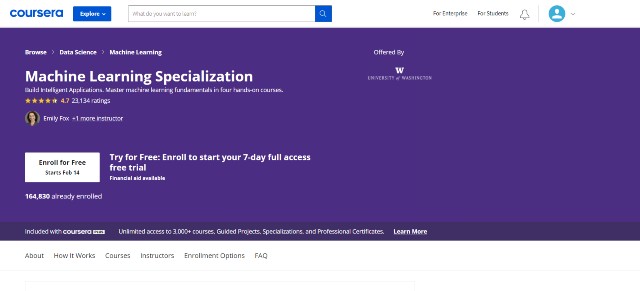
Course Content
There are four minor courses in this specialization as follows.
1. Machine Learning Foundations – The first course will introduce you to machine learning tools that fit specific tasks and provide a brief overview of later courses.
2. Regression – You will start with the simplest machine learning model: Regression. You will use different types of regression models to predict house prices. The instructor will explain features, techniques, and how to implement them in Python.
3. Classification – This course will teach you about one of the most popular machine learning applications. You will create classifiers that can analyze sentiment and predict loan defaults by utilizing logistic regression, decision trees, and many more.
4. Clustering & Retrieval – The last course will guide you through machine learning algorithms that can create recommender systems (you have seen it on Amazon when you view any product.) You will learn many concepts and techniques here, including K-nearest neighbors, MapReduce, and many more.
The university suggests that you spend 3 hours a week for seven months to complete the entire specialization.
Regarding pricing, you need to pay $49 per month to access the entire course. Alternatively, you can audit the curriculum for free, albeit with no graded assignments and completion certificates.
Since the entire specialization has had no updates since 2016, the course materials used to complete projects are outdated. Hence, I suggest you stick to free auditing.
Pros and Cons
Pros
- The case study approach is engaging. The course will not focus on boring theories but will touch on machine learning tasks you are already familiar with.
- The instructor will provide you with optional content for each module. This is in-depth knowledge that you can further study if you wish.
- Well-structured Curriculum
- Feature numerous real-life examples
- Clear explanations
- Free auditing
Cons
- All course materials are outdated. Thus, you can use them to work on projects anymore.
8. IBM Machine Learning Professional Certificate
IBM Machine Learning is an online comprehensive machine learning course taught by IBM experts. You will start from the beginning and proceed step-by-step to more advanced content.
Note: Those who want to take this course should have a solid background in mathematics, including statistics, calculus, and linear algebra.
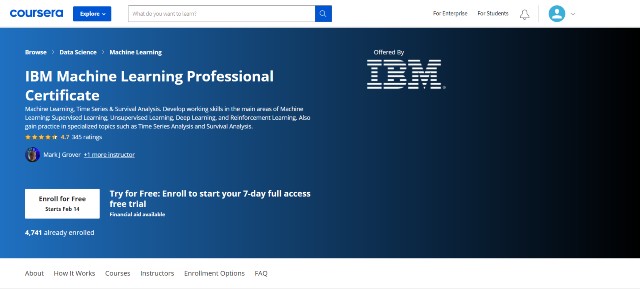
Course Content
This specialization comprises six minor courses as follows.
1. Exploratory Data Analysis for Machine Learning – This first course will review the data analysis knowledge necessary for machine learning.
You will retrieve data from various databases such as SQL and NoSQL and clean any issues and problems associated with them.
2. Regression – You will get started with supervised learning by training linear regression models to predict various outcomes. Later on, you will learn several techniques and best practices to improve your results.
3. Classification – You will move toward logistic regression models, decision trees, and many more. Your task here is to train them to classify outcomes.
The instructor will also guide you through best practices and supplementary techniques, including train & test splits and handling of unbalanced classes dataset.
4. Unsupervised Learning – You will learn about machine learning algorithms that allow your models to find insights from datasets without the specific target variable. Your instructor will also explain clustering and its problems in detail.
5. Deep Learning and Reinforcement Learning – IBM instructors will introduce you to these two advanced machine learning topics. You will understand their theoretical relationship to neural networks and real-world applications.
6. Specialized Models: Time Series and Survival Analysis – This final course will integrate machine learning with the time series model. You will understand how to adapt your machine learning models to be suitable for making predictions on datasets with a time component.
IBM suggests spending 3 hours per week for six months to complete the course.
Regarding pricing, you can access the entire specialization at $39 per month. Alternatively, you can choose to audit it for free.
Pros and Cons
Pros
- Well-structured curriculum
- Cover all aspects of machine learning
- Clear and detailed explanations for most lessons
- Provide theoretical explanations of all the main machine learning algorithms, best for those with a Mathematics background
- Receive a digital badge from IBM apart from a certificate
Cons
- Several reviewers noted that the explanations could be better (this drawback only applies to the first course of the specialization.)
Coursera Plus
If you want to enroll in two or more courses on Coursera, I suggest you subscribe to Coursera Plus.

At $399 per year ($33.25 per month,) you will get access to more than 3,000 courses for one year. In other words, you can enroll in any course on Coursera at no extra cost. You can access all courses for one year, which provides excellent value for steadfast students.
Apart from more courses and flexibility, the monthly payment is considerably lower than enrolling in each course one by one, costing $39-$79 per month.
You can try Coursera Plus for free for 14 days
[sc name=”coursera” ][/sc]9. Machine Learning by Columbia University (Archived)
As of March 2023, this course is now archived. If you are interested, you will need to wait until the university announces future dates.
This edX course from Columbia University is another solid option to consider for those who seek a comprehensive tutorial for machine learning. You will learn most machine learning concepts in one go (deep learning excluded.)
Before enrolling, you should understand the math indicated in the prerequisites (see above).

Course Content
The course comprises two parts as follows:
The first part will discuss supervised learning, including regression and classification. The instructor will explain each technique and algorithm in detail, such as linear/logistic regression, support vector machines, and classifiers.
The second part will tackle unsupervised learning and drill deep into its three fundamental problems: data clustering, matrix factorization, and sequential models.
In each part, you will learn machine learning from both probabilistic versus non-probabilistic viewpoints, along with techniques to optimize algorithms for improved results. In this part, you will learn to build recommendation engines as well.
You can audit this course for free. However, if you want a certificate and feedback on your assignments, you have to pay a one-time $249 to access the full course.
To complete the entire course, you will have to spend 8-10 hours a week for 12 weeks.
Pros and Cons
Pros
- Clear and detailed explanations of the math behind all machine learning algorithms
- Well-structured curriculum
- Informative and in-depth lessons
- Free auditing
Cons
- Unlike most edX courses, this course is not self-paced but instructor-led. Thus, you will have a fixed course schedule. Late submission of assignments may hinder students from receiving a certificate
- High weekly commitment.
Advanced Machine Learning Enginner Courses
Course 10-13 are Udacity’s Nanodegree programs. All of which will have the same information regarding student support, pricing, and pros & cons. Thus, I discuss it only once at the end of Course 13.
10. AWS Machine Learning Engineer
This program will equip you with the skills to use Amazon SageMaker to create and deploy advanced machine learning models. As one of the most popular ML platforms, Amazon SageMaker is one of the most critical skills machine learning engineers should excel in.
You will not need to master Amazon SageMaker before enrolling in the program since you will learn how to use them from the very beginning.
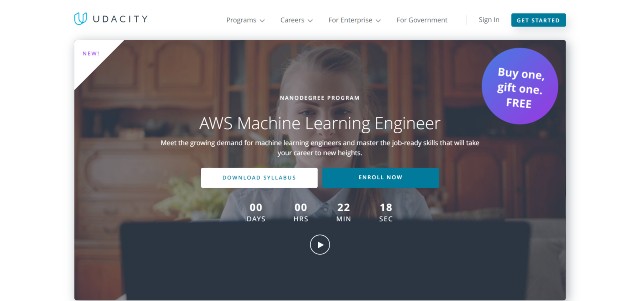
Course Content
Created in collaboration with AWS, this program consists of five sections as follows:
1. Introduction to Machine Learning – The first section will review all machine learning concepts through Amazon Sagemaker. You will learn how to use SageMaker Studio to perform exploratory data analysis.
Later, you will learn how to create machine learning workflows, including data cleaning, feature engineering, model evaluation, and hyperparameter tuning. Finally, you will also grasp methods to create more complex models with XGBoost and AutoGluon.
2. Developing Your First ML Workflow – The second section will drill deep into machine learning principles. You will train, deploy, and test machine learning models through Amazon SageMaker and utilize Lambda and Step Functions to create a robust workflow.
The second part will focus on monitoring the workflow and utilizing what you have learned to build an end-to-end ML pipeline.
3. Deep Learning Topics within Computer Vision and NLP – The third section will introduce you to deep learning, ANNs, CNNs, and how to train them on Amazon SageMaker.
Note: You will not need prior deep learning experience. However, basic knowledge of the subject would be helpful.
4. Operationalizing Machine Learning Projects on SageMaker – The fourth section will discuss miscellaneous but important issues deploying ML models on SageMaker. You will learn to optimize your model to handle high traffic and manage large datasets while saving budgets.
5. Capstone Project – Once you have completed all four sections, you will put all you have learned into use. You will build a sophisticated ML model to monitor and manage inventory for distribution centers.
Apart from the capstone project, each section also supplies you with quizzes, assignments, and a real-world project. For example, you will build an image classification tool in the third section.
Thus, you will have abundant opportunities to get hands-on experience that you can showcase to your future employers and clients.
Regarding the pace, you should spend 5-10 hours per week on the program, and you will complete it in five months. The course pace is intense but still manageable for those with full-time employment.
11. Become a Machine Learning Engineer for Microsoft Azure
This Nanodegree program will guide you to perform ML engineering tasks on Azure Machine Learning, another highly popular ML platform. You will learn the basics and proceed to more advanced topics with confidence.
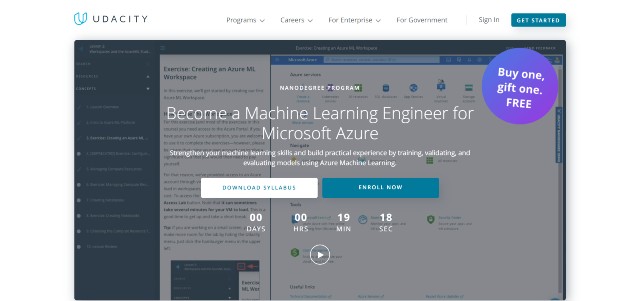
Course Content
This program comprises three sections as follows:
1. Using Azure Machine Learning – The first section will introduce you to Azure Machine Learning. You will learn how to design, create, configure, and optimize pipelines in Azure.
2. Machine Learning Operations – The second section will drill deep into DevOps topics of machine learning. You will learn to select the proper targets for your model, enable app insights, and identify problems in logs. Upon completion, you will then grasp how to create a production-ready model.
3. Capstone Project – You will train and deploy a machine learning model from scratch. Feel free to choose any dataset and the type of model you want to train. Once you have done so, you will evaluate the performance and deploy the best one as a web service.
Like other Udacity Nanodegree programs, you will have numerous assignments to complete in each section, including real-world projects, effectively strengthening your skills in the process.
Pace: 5-10 hours per week for three months
12. AI Engineer using Microsoft Azure
In my opinion, this program serves as an excellent sequel to the 11th course. Unlike the former that focuses on Azure Machine Learning, this course will drill deep into the applications of various Azure tools such as Azure Cognitive Services to create an end-to-end Azure AI solution.
If you want to become a proficient AI developer, enrolling in this program can be extremely helpful.
Important Note: Unlike the 11th course, this one requires students to have foundational knowledge of Microsoft Azure. Furthermore, you should be familiar with Azure SQL, Azure Data Lake, JSON, and REST API.

Course Content
1. Building Computer Vision Solutions with Azure – The first section will introduce you to computer vision topics. You will use vision-based Azure Cognitive Services such as Azure Face, Azure Video Analyzer, and Azure Form Recognizer to create practical AI solutions.
2. Building NLP and Conversational AI Solutions with Azure – The second section will explore more use cases for the Azure platform. You will build chatbots and other assistant solutions using natural language processing (NLP) with Azure.
Subsequently, you will implement Azure Text and Speech Cognitive Services in your applications. Therefore, you will be able to create real-world bot applications on your own handily.
3. Building Knowledge Mining Solutions with Azure Cognitive Search – The final section will discuss steps to design an Azure Cognitive Search Solution. You will learn to add data sources and enrich and index the data.
Upon section completion, you will be ready to build an AI-powered data mining app.
The program features several mind-blowing projects, including an automated passenger boarding kiosk, a virtual assistant for a dental clinic, and an AI-powered training solution.
All are adequately challenging, thus suitable for adding to your Github portfolio to showcase your machine learning skills.
Pace: 5-10 hours per week for three months
13. Machine Learning DevOps Engineer
DevOps for machine learning is an area that online courses rarely cover in detail. This Nanodegree program is one of the few courses that help you gain the essential skills to streamline the workflow of machine learning model creation.

Course Content
This program consists of four sections as follows:
1. Clean Code Principles – The first section will discuss coding best practices that you should implement to ensure your model performs as expected. Later, you will learn the optimal methods for testing and logging in production settings to warrant model quality over time.
2. Building a Reproducible Model Workflow – The second section will drill deep into best practices and techniques regarding reproducible workflows. You will learn the foundational concepts of MLOps and use MLflow to create and deploy your model.
3. Deploying a Scalable ML Pipeline in Production – The third section is dedicated to model deployment. You will learn to put a finishing touch on model performance. Subsequently, you will learn about CI/CD to facilitate the preparation of model deployment.
4. Automated Model Scoring and Monitoring – The final section will provide instructions on automating DevOps processes. Later, the section will explain how to set up regular scoring processes to evaluate the model over time.
Finally, you will learn to diagnose issues with your model and perceive situations requiring a retrain and redeployment.
Like other Nanodegree programs, you will work on several eye-opening real-world projects. For instance, you will build a functional machine learning pipeline to handle bulk data that a real estate company receives every week.
Pace: 10 hours per week for four months
Student Support & Pricing
Student Support: Technical Mentor Support, Project Reviews, and Career Services (Read more on #5)
Price: $399 monthly or $339 per month (bundle pricing). You should create an account to access personalized discounts, effectively reducing course fees by up to 75%.
Pros & Cons
Pros
- Feature topics that are rarely taught in online machine learning courses (Amazon SageMaker, Azure Machine Learning, Azure Cognitive Services, and DevOps)
- Comprehensive and well-structured curriculum (created in collaboration with AWS and Microsoft)
- Learn from a team of veteran machine learning engineers and AI specialists
- In-depth and informative lessons that cover advanced machine learning techniques
- Offer tons of opportunities for students to gain hands-on experience through mind-blowing projects
- Excellent student support from the team
Cons
- Costlier than other alternatives
- Projects can be extremely challenging for students.
14. Machine Learning Engineering for Production (MLOps) Specialization
This Coursera specialization is another robust option to learn about DevOps for machine learning (MLOps). You will learn from Andrew Ng, one of the leading experts in AI engineering.
Note: Before enrolling in the program, you should have background experience in deep learning frameworks.
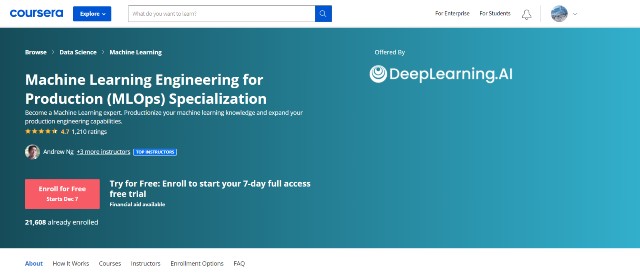
Course Content
This program comprises four minor courses as follows:
1. Introduction to Machine Learning in Production – The first course will discuss how to design a production system end-to-end. You will also learn to create a model baseline and prototype the process for developing and deploying a production-ready ML app.
2. Machine Learning Data Lifecycle in Production – The second course will explain how to build data pipelines and methods to clean datasets, assess data quality, and implement various techniques to obtain accurate results.
Subsequently, you will leverage data lineage and provenance metadata tools to establish a data lifecycle.
3. Machine Learning Modeling Pipelines in Production – The third course will explore tools and techniques that you can use to manage your resources and solve various problems from your models with different serving environments.
4. Deploying Machine Learning Models in Production – The final course will include everything related to deployment. You will learn to deploy machine learning models and build a scalable infrastructure to support them.
Furthermore, you will implement workflow automation to streamline the production process and monitor the system to detect issues that may occur (model decay, performance drop, etc.)
Although this program covers the same content as Udacity’s program (Course 13), it is not in-depth nor offers sufficient real-world experience (it focuses on the theoretical). Hence, it may not serve well as an optimal alternative.
Still, you can audit this program for free, while the complete program costs $49 per month.
Pros & Cons
Pros
- Learn from leading a team of leading AI researchers
- Well-structured curriculum
- Straightforward explanations of best practices
- Excellent reading and additional resources
- Free auditing
Cons
- The content covers only the basics.
- The assignments are not challenging. You should look elsewhere if you want to gain hands-on experience.
15. ProjectPro
Suppose you have taken some machine learning courses, but you still believe that your skills are not up to professional standards. You may want to subscribe to ProjectPro.
Unlike other courses on this list, ProjectPro does not teach machine learning. Instead, it supplies learners with 120+ real-world data science projects. Hence, you can practice your knowledge and obtain significant hands-on experience.
Important Note: All ProjectPro projects are highly challenging. Before enrolling, you should complete some advanced machine learning courses (see above) or have a solid foundation of the subject matter.
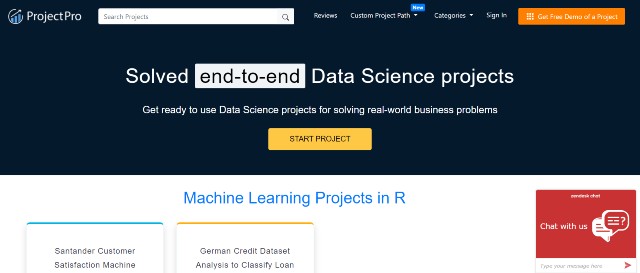
Program Details
Among 120+ end-to-end data science projects on ProjectPro, thirty are machine learning projects. Below are some that I found compelling.
House Price Prediction Using Machine Learning – In this project, you will train machine learning models to analyze the real-world housing dataset (provided by Zillow) and predict the trend of house prices.
You will be responsible for the entire process, starting with data cleaning. You will train multiple models using various techniques and evaluate them to select the optimal model with the highest predictive performance.
Demand Prediction of Driver Availability Using Multistep Time Series Analysis – You will create supervised machine learning models for this project.
Generally speaking, you will perform data preprocessing and exploratory data analysis on time-series data. Subsequently, you will create machine learning models to predict the availability of food delivery drivers.
Based on my observations, project difficulty varies significantly. If you are a new subscriber, you may request a custom project path and start with the most elementary projects (which are still more challenging than those you have done in basic courses.)
All projects also come with the following learning resources:
- Detailed project descriptions: All of them will present real-world business problems from start to finish
- Complete real-world datasets
- 3-5 hour video solutions, explaining the entire process
- Downloadable solution code and informative documentation
Hence, you will have all the resources to complete the projects end-to-end. You don’t need to go over dozens of online forums to search for project solutions anymore.
Pricing
Currently, ProjectPro offers two pricing plans as follows:
- Personal 6-Month – $135 per month or $810 per year
- Personal Annual – $73 per month or $876 per year

Both plans provide access to all resources on the platform. However, the annual plan is a better option. By paying an extra $66, you will get the following.
- Extra 6 months of subscription
- Access to new projects (3-5 added every month)
- Learning Paths
- 1:1 sessions for Mock Interview and Resume Prep
- Email Technical Support
Both plans have a 90-day money-back guarantee. If you are unsatisfied with ProjectPro, you can request a full refund of your tuition. Thus, you can subscribe without any risk.
Pros & Cons
Pros
- Provide 120+ end-to-end real-world projects that fully represent real-world business problems for students to complete and obtain hands-on experience
- Excellent supplementary resources for every project, including informative video solutions and the source code.
- Email support to request assistance if you get stuck. You don’t need to ask on online forums again.
- 90-day money-back guarantee
Cons
- Projects are extremely challenging. Hence, they may not be suitable for intermediate learners.
- High entry price
- No monthly subscription
Applied Machine Learning Courses
Unlike courses that I have recommended above, these courses are applied machine learning courses based on specific industries, such as Finance, Fintech, Engineering, and many more.
Not all these courses are for beginners. You may need prior machine learning skills.
Machine Learning and Finance – An excellent program on edX by New York University. You will learn how to apply machine learning to the financial industry, such as creating better predictions for the stock price.
Auditing the course is free. A complete experience will cost $1,438.
Fintech: AI & Machine Learning in the Financial Industry – A course by UT Austin to educate learners on how to apply machine learning to fintech areas, such as crowdfunding, Robo-advising and many more
This one-time pricing is $850.
By the way, if you are interested in learning to use machine learning in Finance, I suggest you read my article “AI in Finance course.”
Tiny Machine Learning – This course by Harvard provides insights into applying machine learning knowledge to small devices. You will design, build and deploy your tiny machine learning on your own.
You are free to audit the course, while the verified track, which includes instructor support, graded assignments, and a certificate, costs $537.
Quantum Machine Learning – A course from the University of Toronto that foresees how we will use quantum computers with machine learning
The course is free to audit, while the entire course costs $49.
Bayesian Machine Learning in Python: A/B Testing – Those in the marketing space will be familiar with A/B testing, which allows them to find landing pages or Facebook Ads that perform best. This course will provide insights into how it works and methods to improve performance even further.
You have to buy this Udemy course to access all of its content.
Free Machine Learning Courses
Below are free machine learning courses you can take online.
Introduction to Machine Learning – A free course by Udacity. You will learn all the basic machine learning concepts, starting with Naive Bayes and clustering.
Elements of AI – Supported by the Finnish government, Elements of AI teaches learners essential machine learning and AI (Artificial Intelligence.)
Edureka Free Machine Learning Tutorial – Edureka is a platform that offers live machine learning classes. However, the team allows you to access parts of their content for free.
What Should I Learn After Machine Learning?
The optimal option is to learn deep learning. You can learn Pytorch and Tensorflow to train your artificial neural network or explore reinforcement learning, natural language processing, and computer vision.
Once you complete them all, you can start your machine learning project or submit your application for tech jobs.